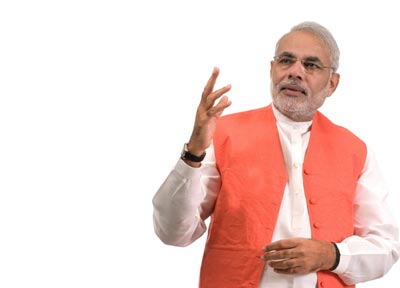 When
When Narendra Modi muscled his way to the top echelons of the Bharatiya Janata Party (BJP) with his usual chutzpah, he must have presumed that it was only a question of time before he was chosen the party's prime ministerial candidate.
The only known dissenter, LK Advani, had been neutralized by the Rashtriya Swayamsewak Sangh (RSS) with the sop of being kicked upstairs to be a mentor. The fiery rath yatri (chariot rider) of the 1990s was expected to play the role of an ineffectual elderly guardian for whom the brash, not-so-young aspirant to be the head of a conservative Hindu joint family had no time.
But the ambitious go-getter does not seem to have factored in the numerous cross-currents of mainstream politics. Used as he is to the somnolence of his one-man show in Gujarat, he probably has not reckoned with the turbulence of national politics, where the bon homie of formal meetings in front of television cameras does not reflect genuine camaraderie.
As much is evident from the absence of his face among the pictures of party stalwarts adorning Madhya Pradesh Chief Minister Shivraj Singh Chauhan's vehicle traversing the state in a yatra. Considering that the photo of Karnataka's Ananth Kumar features in the display, the fact that the party's national-level campaign chief is missing sends out the unmistakable message that he is not as "popular" as BJP president Rajnath Singh claims.
Considering how Advani praised Chauhan by emphasizing how the low-profile chief minister had lifted Madhya Pradesh by the bootstraps to be among the developed states whereas Gujarat was already a front-runner when Modi took charge, cynics might detect the mentor's hidden hand behind Chauhan's snub to Modi.
Even as Chauhan played down the significance of the episode relating to his "elder brother" Modi, Bihar's gadfly, Shatrughan Sinha, expressed the view that Modi's prime ministerial goal had to be blessed by Advani, the "biggest statesman".
What these inner-party rumbles indicate is a brewing storm. In Gujarat, Modi had little difficulty in riding roughshod over dissent, shunting out challengers like the unprepossessing Keshubhai Patel and a small-timer like Sanjay Joshi.
But the national stage is much larger and has more canny players. The relative silence of Advani, Sushma Swaraj, Arun Jaitley and others is more indicative of the sullen quiet which precedes a squall than the pleased acceptance of a new entrant on a big platform.
The silence may have a purpose. It is to let Modi and his supporters trip themselves, as Modi did with his "puppy" and "Hindu nationalist" remarks and Rajnath Singh with his anti-English views.
As if this return to the saffron camp's hardline agenda is not enough, Amartya Sen has stepped into the fray with the observation that the prime minister should not be a person who scares a section of the people. Not surprisingly, the BJP has promptly charged the Nobel laureate with being a Congress supporter and at least two saffron apparatchiks have called for revoking the Bharat Ratna award conferred on him.
For the BJP, the political scene has been rendered more confusing by recent opinion polls which have favoured the party. Interestingly, the level of popular satisfaction with the chief ministers is the highest for Chauhan (82 percent) and lowest for Modi (64 percent) with Raman Singh of Chhattisgarh in the middle with 75 percent.
It must be obvious for the BJP, therefore, that while the party may be gaining, its inability to solve the leadership question is bound to create problems in the future.
As it is, whatever gains that the BJP has made according to the polls are by default as a result of the Congress's many failures, starting with the series of scams followed by the policy paralysis leading to an economic slump. There is nothing to show that Modi's arrival on the national stage has made any difference.
For instance, while the gains predicted for the BJP in Gujarat are only to be expected in view of the party's recent successes there, in Maharashtra, the Congress-National Congress Party alliance has managed to hold its own against the Shiv Sena-BJP combine.
In Uttar Pradesh, the rise in the BJP's tally of seats can be ascribed not only to the Akhilesh Yadav government's poor performance but also to the fact that two successive governments led first by Mayawati and then by Yadav have failed the people. Hence it is possible that the electorate will turn to the BJP. But the Modi factor is not of prime importance in this context. As it wasn't in Karnataka, where his campaigning did not save the BJP from defeat.
Given the latent, but substantial opposition to him from within the party and the reluctance of allies like the Shiv Sena to back him, Modi's chances of making it to the top do not look all that certain at the moment.
 When Narendra Modi muscled his way to the top echelons of the Bharatiya Janata Party (BJP) with his usual chutzpah, he must have presumed that it was only a question of time before he was chosen the party's prime ministerial candidate.
When Narendra Modi muscled his way to the top echelons of the Bharatiya Janata Party (BJP) with his usual chutzpah, he must have presumed that it was only a question of time before he was chosen the party's prime ministerial candidate.